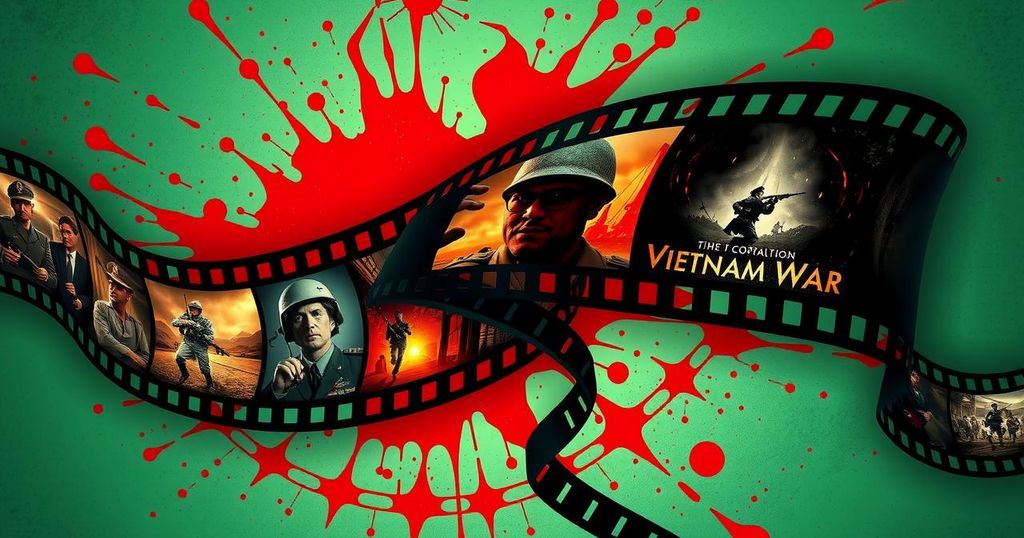Ten Films That Defined the Vietnam War in Cinema
This article highlights ten significant films that capture the Vietnam War’s multifaceted legacy, ranging from classic anti-war narratives to poignant Vietnamese portrayals, commemorating the war’s enduring influence on cinema.
The Vietnam War profoundly influenced American cinema, prompting filmmakers to confront its complex legacy. As we commemorate the 50th anniversary of the fall of Saigon, we reflect on ten films that range from impactful anti-war narratives to poignant Vietnamese portrayals of resistance, highlighting the enduring traumas of the conflict.
1. “The Big Shave” (1967): This six-minute short film by Martin Scorsese showcases a man shaving, transforming what begins as an ordinary moment into a gruesome metaphor for Vietnam, illustrating the war’s violent nature through symbolic imagery.
2. “The Little Girl of Hanoi” (1974): Directed by Hải Ninh, this film follows a young girl’s search for family amid the destruction of Hanoi. It serves as both wartime propaganda and a heartfelt representation of human resilience during the devastating December 1972 bombing raids.
3. “Hearts and Minds” (1974): Peter Davis’ documentary juxtaposes newsreel footage with poignant homefront interviews, providing a sobering insight into the distance between American policy and the realities faced in Vietnam. The title alludes to President Lyndon B. Johnson’s statement emphasizing the importance of winning the support of the local populace.
4. “The Deer Hunter” (1979): This film by Michael Cimino is heralded as one of the most significant depictions of the Vietnam War. It follows the traumatic journey of three working-class friends whose lives are irrevocably changed by their wartime experiences, culminating in a haunting final scene.
5. “Apocalypse Now” (1979): Francis Ford Coppola’s ambitious adaptation of Joseph Conrad’s “Heart of Darkness” takes viewers deep into the madness of war. The film’s surreal imagery and nightmarish portrayal of Vietnam capture the chaos and moral ambiguity inherent in the conflict.
6. “Platoon” (1986): Oliver Stone’s Oscar-winning film draws heavily from his own experiences as an infantryman. It is revered for its stark realism and remains one of the most vivid portrayals of the Vietnam War, contributing to the cultural understanding of the conflict during the 1980s.
7. “Full Metal Jacket” (1987): Stanley Kubrick’s film explores the dehumanizing aspects of military training and warfare. Through contrasting scenes of boot camp brutality and urban combat, it critiques the brutal realities faced by soldiers during the Vietnam War.
8. “Little Dieter Needs to Fly” (1997): In this documentary, Werner Herzog tells the story of Dieter Dengler, a German-American pilot who was shot down in Laos. Herzog investigates the impact of war on the human experience, shedding light on themes of survival and trauma.
9. “The Fog of War” (2003): This documentary features Robert S. McNamara, a key architect of the Vietnam War, reflecting on the flawed ideologies behind the conflict. It presents a complex narrative that underscores the moral reconciliations and lessons learned from one of America’s most contentious military engagements.
10. “The Post” (2017): Directed by Steven Spielberg, this film centers on the Washington Post’s decision to publish the Pentagon Papers, revealing the government’s deceptive practices during the Vietnam War. Focusing on Katharine Graham, it emphasizes the crucial role of the press during wartime.
For additional insights on the Vietnam War’s 50th anniversary, please visit https://apnews.com/hub/vietnam-war.
In summary, these ten films not only reflect the complexities of the Vietnam War but also encapsulate its lasting impact on American culture and filmmaking. From evocative narratives that humanize the conflict to significant commentaries on war and media, these cinematic works continue to resonate with audiences today, serving as a poignant reminder of the past.
Original Source: www.ivpressonline.com




Post Comment